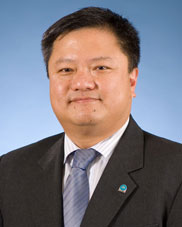The manufacturing industry in Australia is embarking on a sixth "wave of innovation" – and it won’t be an easy ride, according to Dr Swee L Mak, head of CSIRO's Future Manufacturing Flagship.
Dr Mak explained that industry had come through five previous waves of innovation since the British industrial revolution of the 18th Century.
"These waves of innovation were water power, steam power, electrification, mass production and telecommunications," he said.
"And now industry is facing perhaps its biggest change – moving to better resource efficiency and eventual sustainability."
Dr Mak was speaking to a gathering of senior executives at the recent Western Sydney Manufacturing Leaders Forum, held at the Sydney Olympic Park.
The demand for sustainable manufacturing is being driven by the need to produce more goods using fewer materials and less energy to satisfy an increasingly prosperous developing world population while husbanding finite global resources, noted Dr Mak.
"Manufacturing must be cleaner and more efficient in its use of materials and energy," he emphasised.
Dr Mak's comments come after CSIRO chief Megan Clark said business leaders were already acting on the assumption that carbon would be taxed.
Like other speakers at the event, Dr Mak conceded that the Australian manufacturing industry would find this challenge more difficult due to contraction. He noted how the industry had shrunk from contributing 30 per cent of GDP in 1950 to around 10 per cent now.
Nonetheless, according to Dr Mak: "Australian manufacturing is uniquely placed to help capture opportunities in the emerging greener global economy because it’s responsible for [conducting] 40 per cent of R&D and [employing] 16 per cent of scientists and engineers".
Dr Mak claimed his organisation, CSIRO’s Future Manufacturing Flagship, was well placed to help manufacturing companies – particularly small-to-medium enterprises (SMEs) – become sustainable ventures. The flagship’s mission is to establish sustainable competitiveness for manufacturing companies by researching and developing clean, advanced materials and process technologies.
"SMEs need help to surmount this next wave of innovation," he said.
"Australian universities are a good source of assistance and so is CSIRO. We’ve already worked with over 500 SMEs, offering technical advice and assisting with technology transfer and commercialisation of IP [Intellectual Property]."
Dr Mak claimed that a driving force for this industry collaboration was: "to make sure CSIRO science gets used in the commercial sphere". He pointed to the 160 plus active licences of CSIRO technology which include polymer bank notes, pleats in skirts and much of the RF technology underlying Wi-Fi wireless communication.
"But we have to play in areas where we have competitive advantage and natural resources," he added, citing the example of titanium of which Australia holds 40 per cent of the world’s resources in addition to many scientists and engineers who are expert in metallurgy.
The Western Sydney Manufacturing Leaders Forum is an event that supports National Manufacturing Week (NMW). NMW is an annual gathering and this year was held in Melbourne at the end of May. NMW is organized by Reed Exhibitions.






